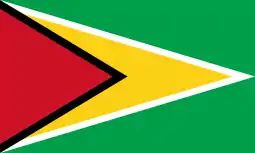Guyanese people
Guyanese people are people identified with Guyana. Geographically, Guyana is part of the South American mainland, however it is much more culturally similar to the Suriname and nearby island nations of the Caribbean such as Trinidad and Tobago as compared to the rest of South America. In fact, Guyana is considered a culturally Caribbean country even though it is not an island nation located in the Caribbean Sea, as are most Caribbean nations.
 | |
| Total population | |
|---|---|
| c. 1,250,000 | |
| Regions with significant populations | |
| 281,371 | |
| 84,275[1] | |
| 40,872 | |
| 14,560 | |
| 11,530 | |
| 7,401 | |
| 1,000 | |
| 1,000 | |
| 1,000 | |
| Languages | |
| English, Guyanese Creole, Guyanese Hindustani, Tamil, Chinese, Portuguese, Spanish, Dutch, Indigenous languages | |
| Religion | |
| Christianity (Roman Catholic, Protestants), Hinduism, Islam, Rastafarian, Baháʼí, Buddhism, Afro-American religions, Traditional African religions, Chinese folk religion (Taoism and Confucianism) | |
Overview
Guyana is also a founding member of the Caribbean Community CARICOM; however, it shares some of the Latin American customs and traits that are characteristic of its South American neighbours and is also a founding member of the Union of South American Nations which was formed in 2008. In addition to some Latin American and a great deal of Caribbean influence, Guyana's culture also reflects its European history as it was colonized by both the Dutch and French before becoming a British colony. As a matter of fact, the capital city of the country, Georgetown, was previously called Longchamps and Stabroek under the French and Dutch respectively. Additionally, numerous Guyanese towns and villages have French and Dutch names which reflect the periods during which the country was colonized by the French and Dutch. As would be expected, the pronunciations of the names of those towns and villages are anglicized. Guyana (known as British Guiana under British colonial rule), gained its independence from the United Kingdom in 1966 and subsequently became a republic in 1970. As a result of Guyana's long, 170-year history as a British colony, it is a part of the Anglophone world. Since the country is more culturally Caribbean than it is South American, it is considered to be a part of the Anglophone Caribbean - a subregion of the Caribbean consisting of independent, English-speaking nations that were once British colonies (also known as the Commonwealth Caribbean). Guyana is the only English-speaking country in South America; however, the majority of people in Guyana actually speak Creolese informally. Creolese is a creole language that is largely based on English infrequently interspersed with anglicized French words. Standard English, i.e. British English spelling and pronunciation, is used for all business and education and is typically consistently spoken by members of the upper and upper-middle class.
Demographics
Guyana is a diverse nation; 39.8% of the population is of Indian origin (see Indo-Guyanese), 30% African (see Afro-Guyanese), 19.9% multiracial (almost all part African, including Dougla, Creole-Mulatto, Zambo-Maroon, and Pardo), 10.5% Amerindian and 0.5% other, mostly Chinese, Europeans (most notably Portuguese), Arabs, Brazilians and Venezuelans. The terms "Indo-Guyanese" and "Afro-Guyanese" seem to have only become a part of the Guyanese vernacular within the last 20 years or so. Creolese (Guyanese Creole) is the most common language amongst Guyanese while British English is taught in school, and used in government and business. Guyanese tend to be quite adept at code-switching, using either Creolese or British English when appropriate. The religious breakdown of Guyanese people is: Hindu 28.4%, Pentecostal 16.9%, Roman Catholic 8.1%, Muslim 7.2%, Anglican 6.9%, Seventh-day Adventist 5%, other Christian denominations 20.5%, no religion 4.3%, Rastafarian 0.5%, Baháʼí 0.1%, other faiths 2.2%.[2]
Diaspora
Overseas Guyanese communities mainly exist in the United States (86,120 Guyanese born), United Kingdom (20,872 Guyanese born), Canada (14,560 Guyanese born), and the Netherlands (328 Guyanese born), although the total populations (i.e. people of Guyanese descent born in that country) are much higher.
The migration of Guyanese to other countries began in the late 1950s when some Guyanese (mainly young men, and some women) took up offers from the British Government to migrate to England to supplement the British labour force, like other Caribbean countries. This was a short lived policy as the British government quickly closed the doors on open immigration from its Caribbean Territories. The migration of many Guyanese Portuguese to the U.K and Canada happened in the late 1960s and early 1970s due to political struggles and problems at the time.
The migration of Guyanese to other Western countries, mostly Canada and the United States, continued throughout the 1970s and 1980s, much of it due to political and economic problems. Discontent with the Forbes Burnham government, misguided economic policies, and shortages of basic items led to large-scale emigration during the 1980s. While many left due to political, economic, and social problems, those who could afford it left looking for better opportunities and some for educational purposes. The 1990s saw migration to other Caribbean countries. Migration continued by the need to reconnect split families. The migration of Guyanese to other lands continues today.
See also
- Demographics of Guyana
- Indo-Guyanese
- Afro-Guyanese
- Guyanese American
- Guyanese British
- Guyanese Canadians
- Women of Guyana
References
- Government of Canada, Statistics Canada (8 February 2017). "Census Profile, 2016 Census - Canada [Country] and Canada [Country]". www12.statcan.gc.ca.
- "The World Factbook". Cia.gov. Retrieved 2015-12-13.
External links
![]() This article incorporates public domain material from the CIA World Factbook website https://www.cia.gov/the-world-factbook/.
This article incorporates public domain material from the CIA World Factbook website https://www.cia.gov/the-world-factbook/.
